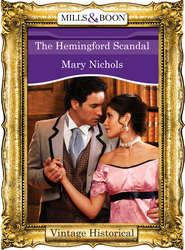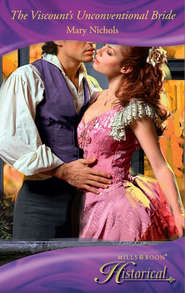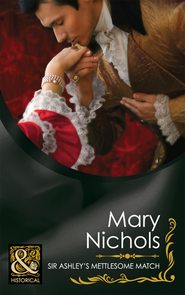По всем вопросам обращайтесь на: info@litportal.ru
(©) 2003-2024.
✖
The Price Of Honour
Настройки чтения
Размер шрифта
Высота строк
Поля
The Price Of Honour
Mary Nichols
Olivia Pledger, through her own willfulness, found herself stranded in Portugal in the middle of the Peninsular War! A resourceful lady, she was determined to work her way back to the British lines and so get herself home to England.But in foraging a deserted mansion, she was discovered by Robert Lynmount, who had been cashiered in disgrace from Wellington's army. Although intent on scouting unofficially for Wellington until he could clear his name, now Robert felt responsible for Olivia's safety. In such circumstances, falling in love was crazy, and personal feeling could not be allowed to count….
The Price of Honour
Mary Nichols
www.millsandboon.co.uk (http://www.millsandboon.co.uk)
Table of Contents
Cover (#ud7c627cd-b696-5e0b-8006-7e89074483e4)
Title Page (#u888908e6-08cc-5f28-9d5a-bc1534c1daba)
PROLOGUE (#uf95ed153-ceed-5844-a02d-95005dbca127)
CHAPTER ONE (#u2d7201b9-49a5-5b91-a269-e15d743d356a)
CHAPTER TWO (#ua1bd9852-9cd7-5426-a2d7-3cb90703126f)
CHAPTER THREE (#uda6ccfe5-1951-53c7-ab5a-f4e357748cc0)
CHAPTER FOUR (#litres_trial_promo)
CHAPTER FIVE (#litres_trial_promo)
CHAPTER SIX (#litres_trial_promo)
CHAPTER SEVEN (#litres_trial_promo)
CHAPTER EIGHT (#litres_trial_promo)
CHAPTER NINE (#litres_trial_promo)
CHAPTER TEN (#litres_trial_promo)
Copyright (#litres_trial_promo)
PROLOGUE (#ulink_49c72f5b-aad9-5162-b76b-9906496cb1ff)
‘YOU have done what?’
‘We have cashiered him, my lord, for unofficerlike and ungentlemanlike behaviour — after a proper court-martial, of course. In Lisbon.’
The heat in the room was intense and made no cooler by the temper of the commander-in-chief of the British forces, whose names included Hooknose, Nosey, the Peer and the Leopard, a name given to him by Napoleon, to which he had added the epithet ‘hideous’. It did not bother the newly created Viscount Wellington in the slightest; he had adopted it with some amusement and was often heard to refer to his men as ‘my leopards’.
For six months hardly a shot had been fired by either side and the inaction was causing boredom among the troops, not to mention impatience at Westminster. But now the enemy was on the move. Across the Pyrenees they had come, the hordes of Napoleon, eighty thousand strong, marching down through Salamanca towards the Portuguese frontier, mile upon mile of blue and white uniforms, led by Marshal André Masséna and accompanied by heavy cavalry and light horsemen, their coloured plumes moving up and down with the rhythm of their mounts; cuirassiers, whose breastplates glinted in the glaring heat of a Spanish summer; heavy guns on limbers pulled by teams of huge horses, baggage wagons by the thousand, kicking up the dust, advertising their presence to the bands of guerrilleros who watched from their mountain hideouts, ready to pick off stragglers and raid the supply wagons.
They were still a long way from Celerico Da Beira where the British commander-in-chief had his headquarters, and he showed no sign of going out to meet them. While they waited, the officers filled their time with horse racing and shooting matches and the rank and file went fishing and whoring. There were times when the colonel wished the French would hurry their advance and mount an attack, just to give the men something gainful to do, but even if they did it would not happen here. Between them and the enemy front line stood General Craufurd and his Light Division. The colonel envied the dashing general who had found something better to do than keep discipline and worry about supplies.
‘Dammit, he is one of my best scouts.’ Wellington’s voice broke in on his thoughts.
‘Yes, my lord, but you did issue an order that there was to be no looting, and he was caught red-handed. No exceptions, you said, and the officers must set a good example.’ The colonel stood his ground. He had only carried out orders, and how was he to know his lordship would ask for the man specifically? As far as he had been aware, there was nothing out of the ordinary about the fellow.
‘To be sure I did.’ The angry tone of the commander’s voice softened as he realised the justice of what the colonel was saying. ‘Looting, you say?’
‘Yes, my lord.’
‘Of all the ignoble things to be cashiered for,’ his lordship mused. ‘If he had to fall foul of regulations, why could it not be for duelling? At least that has something gentlemanly about it. I could forgive him for that.’
‘Yes, my lord.’
‘Where is he now?’
‘I do not know, my lord. He left.’
‘Has he returned to England, do you think?’
‘I doubt it, my lord; he would not want to face his father, the viscount, and the public disgrace.’
‘Then find him. Find him and bring him to me.’
There was no arguing with Wellington in his present mood; the colonel inclined his head and left the villa which was his regiment’s temporary headquarters. The heat, as he stooped below the lintel and stepped outside, rose to meet him from the baked earth and the strong midday sun almost blinded him. Clapping his cocked hat on his head, he marched across what had once been a field but which now resembled a parade ground as a group of English drill sergeants endeavoured to make soldiers of the untidy riff-raff which made up the Portuguese army. There was a good deal of ribald comment from the red-coated British troops but the untested Portuguese cacadores took it all in good part. They were, after all, going to fight in defence of their homeland and were perhaps the only ones to be glad of the long period of inactivity, in which to train.
Where was Robert Lynmount? the colonel asked himself. Where was the one-time captain of Hussars, hero of the battle of Talavera and now disgraced? And how, in the middle of a war, when he had better things to do, was he going to find him and bring him back? And, what was more, how was he going to reverse the verdict of a properly convened court-martial when there was no doubt about the fellow’s guilt? He swore loudly and sent a trooper in search of Captain Rufus Whitely.
CHAPTER ONE (#ulink_a4a7f951-4065-5f04-be39-e40c26dd550b)
SHE would go home, Olivia decided, back to England, to cool green glades and soft summer rain, to winter fires and roast beef, even to the censure of her friends and Papa’s anger. Papa. If he could see her now, he would most decidedly tell her ‘I told you so’; that was if he even recognised her as the daughter who had stood in his library three years before and rebelliously stamped her foot at him. She had, she remembered, been dressed in a becoming blue gown of watered silk, which had cost him a pretty penny, but then he had always been the most generous of papas—until she’d defied him.
Now she was wearing an old uniform jacket of Philippe’s over a white blouse and green skirt which had certainly seen better days. On her feet were a pair of French infantry boots, nothing like as good as those worn by the British forces but certainly more serviceable than ladies’ shoes, and on her head was a large straw hat tied down with a scarf. Her face, she had no doubt, was suntanned and dirty, and she was painfully thin. No, he would hardly recognise her.
She smiled to herself as she strode along the narrow pot-holed road, empty except for a bearded brown goat which had wandered down from the mountainside to crop the wayside grass, and a buzzard which tore savagely at the remains of a hare, anxious to have its dinner done before it was interrupted. It looked up as she approached, a juicy morsel hanging from its bloodied beak, but, deciding she was no threat, it resumed its meal.
It was funny how easy it was to lose the knack of thinking constructively, especially when all her thoughts kept coming back to the same thing — it was her own fault she was in the mess she was in; she could blame no one but herself. She would go home and face the music. Would the fact that she had been widowed twice in as many years elicit any sympathy from her father? But was it sympathy she wanted? She had never been one to feel sorry for herself, so why should she expect others to be sorry for her?
Tom Beeston was not a suitable husband for her, Papa had said; he was a nobody and she was rich enough to marry a title; he wanted her to marry a title. Besides, they were both too young to know their own minds on the subject. If she married Tom, she could expect no help from him if things went wrong. Young she had been, but she had also been determined and accustomed to having her own way, and this unexpected opposition had taken her by surprise and strengthened her determination. Married they were. Tom, she discovered within a month of the wedding, was a gambler, and before long was so deep in debt that she was in despair. But he had not been prepared for her to be equally stubborn about refusing to ask her father for help.
At his wits’ end, he had fallen victim to the blandishments of a recruiting sergeant, so what else could she have done, she asked herself, but to stick by him and follow the colours? Not for a moment had she anticipated being lucky in the ballot which would allow her to accompany him abroad a few months later. They had hardly set foot in Portugal when the army, under the command of Sir Arthur Wellesley, had marched to free Oporto from the occupying French, and two days after that she was a widow for the first time.
It was the usual practice for women in her position to marry one of her late husband’s comrades and carry on as before, but there was no one she liked well enough and she had had enough of the army. In the torrential rain which followed the battle and hampered the British advance, she had tried to make her way back to Oporto, hoping to find a ship’s captain softhearted enough to carry her back to England. Instead she had blundered into the rearguard of the fleeing French troops. They had seen in her an easy target and would have taken their anger and humiliation out on her if Philippe had not arrived to stop them. Not that she had given in without a struggle; she had seized one of their muskets and turned it on them before they had overpowered her, laughing at her furious kicking and scratching.
It was his sense of fair play and his admiration for her courage that made him defend her in the first place, he had told her, but within days he had declared he loved her to distraction and no one would harm her while he was at hand to protect her. He was a lieutenant and very young, lonely too, she suspected, and highly susceptible. She had liked him enough to agree to marry him when the alternative was too horrible to contemplate, but she did not think she had ever been in love with him, any more than she had, on reflection, been in love with Tom.
That had been over a year ago, and since then she had followed the French camp in much the same way as she had followed the British with Tom, living each day as it came and refusing to think of the future. It had been the same the night before; her only thought had to been to escape from the band of guerrilleros who had killed Philippe, not what she would do afterwards. But with the coming of day she knew she had decisions to make.
The land on either side of the road was parched, the grass dried to the colour of ripe wheat which shimmered in a heat haze that made it look as if it were on fire. Behind her the mountain rose to a craggy peak; to her left the ground fell sharply away so that she was looking down on the tops of the pines which covered the lower slopes and partially hid the village in the valley. It was set on either side of a small river which reflected the cobalt-blue of the sky and looked cool and inviting. Should she make her way down there? Would it be safe? The problem was that she did not know if she was in Spain or Portugal, nor whether the area was in French or allied hands.
Mary Nichols
Olivia Pledger, through her own willfulness, found herself stranded in Portugal in the middle of the Peninsular War! A resourceful lady, she was determined to work her way back to the British lines and so get herself home to England.But in foraging a deserted mansion, she was discovered by Robert Lynmount, who had been cashiered in disgrace from Wellington's army. Although intent on scouting unofficially for Wellington until he could clear his name, now Robert felt responsible for Olivia's safety. In such circumstances, falling in love was crazy, and personal feeling could not be allowed to count….
The Price of Honour
Mary Nichols
www.millsandboon.co.uk (http://www.millsandboon.co.uk)
Table of Contents
Cover (#ud7c627cd-b696-5e0b-8006-7e89074483e4)
Title Page (#u888908e6-08cc-5f28-9d5a-bc1534c1daba)
PROLOGUE (#uf95ed153-ceed-5844-a02d-95005dbca127)
CHAPTER ONE (#u2d7201b9-49a5-5b91-a269-e15d743d356a)
CHAPTER TWO (#ua1bd9852-9cd7-5426-a2d7-3cb90703126f)
CHAPTER THREE (#uda6ccfe5-1951-53c7-ab5a-f4e357748cc0)
CHAPTER FOUR (#litres_trial_promo)
CHAPTER FIVE (#litres_trial_promo)
CHAPTER SIX (#litres_trial_promo)
CHAPTER SEVEN (#litres_trial_promo)
CHAPTER EIGHT (#litres_trial_promo)
CHAPTER NINE (#litres_trial_promo)
CHAPTER TEN (#litres_trial_promo)
Copyright (#litres_trial_promo)
PROLOGUE (#ulink_49c72f5b-aad9-5162-b76b-9906496cb1ff)
‘YOU have done what?’
‘We have cashiered him, my lord, for unofficerlike and ungentlemanlike behaviour — after a proper court-martial, of course. In Lisbon.’
The heat in the room was intense and made no cooler by the temper of the commander-in-chief of the British forces, whose names included Hooknose, Nosey, the Peer and the Leopard, a name given to him by Napoleon, to which he had added the epithet ‘hideous’. It did not bother the newly created Viscount Wellington in the slightest; he had adopted it with some amusement and was often heard to refer to his men as ‘my leopards’.
For six months hardly a shot had been fired by either side and the inaction was causing boredom among the troops, not to mention impatience at Westminster. But now the enemy was on the move. Across the Pyrenees they had come, the hordes of Napoleon, eighty thousand strong, marching down through Salamanca towards the Portuguese frontier, mile upon mile of blue and white uniforms, led by Marshal André Masséna and accompanied by heavy cavalry and light horsemen, their coloured plumes moving up and down with the rhythm of their mounts; cuirassiers, whose breastplates glinted in the glaring heat of a Spanish summer; heavy guns on limbers pulled by teams of huge horses, baggage wagons by the thousand, kicking up the dust, advertising their presence to the bands of guerrilleros who watched from their mountain hideouts, ready to pick off stragglers and raid the supply wagons.
They were still a long way from Celerico Da Beira where the British commander-in-chief had his headquarters, and he showed no sign of going out to meet them. While they waited, the officers filled their time with horse racing and shooting matches and the rank and file went fishing and whoring. There were times when the colonel wished the French would hurry their advance and mount an attack, just to give the men something gainful to do, but even if they did it would not happen here. Between them and the enemy front line stood General Craufurd and his Light Division. The colonel envied the dashing general who had found something better to do than keep discipline and worry about supplies.
‘Dammit, he is one of my best scouts.’ Wellington’s voice broke in on his thoughts.
‘Yes, my lord, but you did issue an order that there was to be no looting, and he was caught red-handed. No exceptions, you said, and the officers must set a good example.’ The colonel stood his ground. He had only carried out orders, and how was he to know his lordship would ask for the man specifically? As far as he had been aware, there was nothing out of the ordinary about the fellow.
‘To be sure I did.’ The angry tone of the commander’s voice softened as he realised the justice of what the colonel was saying. ‘Looting, you say?’
‘Yes, my lord.’
‘Of all the ignoble things to be cashiered for,’ his lordship mused. ‘If he had to fall foul of regulations, why could it not be for duelling? At least that has something gentlemanly about it. I could forgive him for that.’
‘Yes, my lord.’
‘Where is he now?’
‘I do not know, my lord. He left.’
‘Has he returned to England, do you think?’
‘I doubt it, my lord; he would not want to face his father, the viscount, and the public disgrace.’
‘Then find him. Find him and bring him to me.’
There was no arguing with Wellington in his present mood; the colonel inclined his head and left the villa which was his regiment’s temporary headquarters. The heat, as he stooped below the lintel and stepped outside, rose to meet him from the baked earth and the strong midday sun almost blinded him. Clapping his cocked hat on his head, he marched across what had once been a field but which now resembled a parade ground as a group of English drill sergeants endeavoured to make soldiers of the untidy riff-raff which made up the Portuguese army. There was a good deal of ribald comment from the red-coated British troops but the untested Portuguese cacadores took it all in good part. They were, after all, going to fight in defence of their homeland and were perhaps the only ones to be glad of the long period of inactivity, in which to train.
Where was Robert Lynmount? the colonel asked himself. Where was the one-time captain of Hussars, hero of the battle of Talavera and now disgraced? And how, in the middle of a war, when he had better things to do, was he going to find him and bring him back? And, what was more, how was he going to reverse the verdict of a properly convened court-martial when there was no doubt about the fellow’s guilt? He swore loudly and sent a trooper in search of Captain Rufus Whitely.
CHAPTER ONE (#ulink_a4a7f951-4065-5f04-be39-e40c26dd550b)
SHE would go home, Olivia decided, back to England, to cool green glades and soft summer rain, to winter fires and roast beef, even to the censure of her friends and Papa’s anger. Papa. If he could see her now, he would most decidedly tell her ‘I told you so’; that was if he even recognised her as the daughter who had stood in his library three years before and rebelliously stamped her foot at him. She had, she remembered, been dressed in a becoming blue gown of watered silk, which had cost him a pretty penny, but then he had always been the most generous of papas—until she’d defied him.
Now she was wearing an old uniform jacket of Philippe’s over a white blouse and green skirt which had certainly seen better days. On her feet were a pair of French infantry boots, nothing like as good as those worn by the British forces but certainly more serviceable than ladies’ shoes, and on her head was a large straw hat tied down with a scarf. Her face, she had no doubt, was suntanned and dirty, and she was painfully thin. No, he would hardly recognise her.
She smiled to herself as she strode along the narrow pot-holed road, empty except for a bearded brown goat which had wandered down from the mountainside to crop the wayside grass, and a buzzard which tore savagely at the remains of a hare, anxious to have its dinner done before it was interrupted. It looked up as she approached, a juicy morsel hanging from its bloodied beak, but, deciding she was no threat, it resumed its meal.
It was funny how easy it was to lose the knack of thinking constructively, especially when all her thoughts kept coming back to the same thing — it was her own fault she was in the mess she was in; she could blame no one but herself. She would go home and face the music. Would the fact that she had been widowed twice in as many years elicit any sympathy from her father? But was it sympathy she wanted? She had never been one to feel sorry for herself, so why should she expect others to be sorry for her?
Tom Beeston was not a suitable husband for her, Papa had said; he was a nobody and she was rich enough to marry a title; he wanted her to marry a title. Besides, they were both too young to know their own minds on the subject. If she married Tom, she could expect no help from him if things went wrong. Young she had been, but she had also been determined and accustomed to having her own way, and this unexpected opposition had taken her by surprise and strengthened her determination. Married they were. Tom, she discovered within a month of the wedding, was a gambler, and before long was so deep in debt that she was in despair. But he had not been prepared for her to be equally stubborn about refusing to ask her father for help.
At his wits’ end, he had fallen victim to the blandishments of a recruiting sergeant, so what else could she have done, she asked herself, but to stick by him and follow the colours? Not for a moment had she anticipated being lucky in the ballot which would allow her to accompany him abroad a few months later. They had hardly set foot in Portugal when the army, under the command of Sir Arthur Wellesley, had marched to free Oporto from the occupying French, and two days after that she was a widow for the first time.
It was the usual practice for women in her position to marry one of her late husband’s comrades and carry on as before, but there was no one she liked well enough and she had had enough of the army. In the torrential rain which followed the battle and hampered the British advance, she had tried to make her way back to Oporto, hoping to find a ship’s captain softhearted enough to carry her back to England. Instead she had blundered into the rearguard of the fleeing French troops. They had seen in her an easy target and would have taken their anger and humiliation out on her if Philippe had not arrived to stop them. Not that she had given in without a struggle; she had seized one of their muskets and turned it on them before they had overpowered her, laughing at her furious kicking and scratching.
It was his sense of fair play and his admiration for her courage that made him defend her in the first place, he had told her, but within days he had declared he loved her to distraction and no one would harm her while he was at hand to protect her. He was a lieutenant and very young, lonely too, she suspected, and highly susceptible. She had liked him enough to agree to marry him when the alternative was too horrible to contemplate, but she did not think she had ever been in love with him, any more than she had, on reflection, been in love with Tom.
That had been over a year ago, and since then she had followed the French camp in much the same way as she had followed the British with Tom, living each day as it came and refusing to think of the future. It had been the same the night before; her only thought had to been to escape from the band of guerrilleros who had killed Philippe, not what she would do afterwards. But with the coming of day she knew she had decisions to make.
The land on either side of the road was parched, the grass dried to the colour of ripe wheat which shimmered in a heat haze that made it look as if it were on fire. Behind her the mountain rose to a craggy peak; to her left the ground fell sharply away so that she was looking down on the tops of the pines which covered the lower slopes and partially hid the village in the valley. It was set on either side of a small river which reflected the cobalt-blue of the sky and looked cool and inviting. Should she make her way down there? Would it be safe? The problem was that she did not know if she was in Spain or Portugal, nor whether the area was in French or allied hands.











